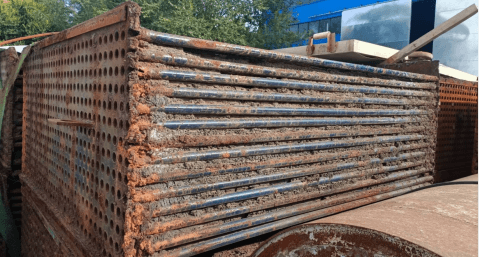There is a close correlation and mutual influence among corrosion, air leakage and ash blockage in boiler air preheaters. The following is a detailed analysis of the relationship among the three:

1. The relationship between corrosion and ash blockage
Corrosion aggravates ash blockage:
Under high temperature environment, oxidation reaction will occur on the metal surface, leading to corrosion. Corrosion will reduce the wall thickness and strength of the air preheater tube, making the tube more vulnerable to damage.
When the air preheater tube wall is corroded, its surface becomes rough and more likely to absorb dust and particulate matter in the flue gas, thereby aggravating the ash blockage phenomenon.
Corrosion will also produce some sticky substances, such as sulfates, which will further promote the formation and accumulation of ash.
Ash blocking promotes corrosion:
Ash blocking will make the flue gas passage unsmooth or blocked. This decreases flue gas velocity. Dust and corrosive substances stay longer on the tube surface.
Ash accumulation acts as a heat insulator between the flue gas and the tube wall, lowering the wall temperature and easily forming low-temperature dew point corrosion. This corrosion will further aggravate the damage of the air preheater.
Ash blocking will also affect the heat exchange performance of the air preheater, causing the exhaust gas temperature to rise, further aggravating the corrosion process.
2. The relationship between corrosion and air leakage
Corrosion causes air leakage:
Corrosion can weaken the wall thickness and strength of air preheater tubes, making them more susceptible to leaks and punctures. These leakage points will cause air to enter the flue gas side without sufficient preheating, causing air leakage.
The impact of low-temperature corrosion on pipe walls is particularly significant. Because corrosive substances such as sulfuric acid vapor are more likely to condense into acid solutions at low temperatures. This can cause corrosion and damage to the pipe wall.
Air leakage aggravates corrosion:
Air leakage will increase the oxygen content in the flue gas and accelerate the oxidation reaction and corrosion process on the metal surface.
At the same time, air leakage will also reduce the temperature of the flue gas. This makes the water vapor in the flue gas more likely to condense into acid solution, further aggravating the corrosion.
3. The relationship between ash blockage and air leakage
Ash blockage leads to air leakage:
Ash blockage will block the flue gas passage, resulting in uneven flue gas velocity and deviation. These phenomena will cause greater scouring and wear of some pipes, thereby increasing the risk of leakage.
Ash blockage will also increase the operating resistance of the air preheater, resulting in increased fan power consumption and reduced unit load capacity. In extreme cases, ash blockage may cause fan stall and unit shutdown.
Air leakage promotes ash blockage:
Air leakage will make dust and particulate matter in the flue gas more easily adsorbed on the pipe surface, thereby aggravating the ash blockage phenomenon.
At the same time, air leakage will also reduce the temperature and humidity of the flue gas, making it easier for dust and corrosive substances in the flue gas to condense and deposit on the pipe surface.
In summary, corrosion, air leakage and ash blockage of boiler air preheaters are interrelated and affect each other. In order to maintain the normal operation of the air preheater and extend its service life, effective measures need to be taken to prevent and reduce the occurrence of these three. For example, the risk of corrosion and ash blockage can be reduced by optimizing the boiler combustion conditions, strengthening the cleaning and maintenance of the air preheater, and increasing the exhaust temperature. At the same time, the occurrence of air leakage can also be reduced by strengthening the sealing performance of the air preheater and regularly checking the leakage points.
The contact ash cleaning device manufactured by Bokk Tech makes the cleaning work more convenient, and the rare earth alloy heat exchange pipe improves the anti-corrosion performance.
About Us
Shandong Bokk Tech is dedicated to solve the problem such as ash blockage, corrosion and excessive exhaust gas temperature in the tubular air preheater of small and medium-sized boilers. We primarily manufacture automatic cleaning devices for tubular air preheaters and corrosion-resistant heat pipes. Our products are widely used in the thermal power plants, chemical plants, new energy sector, etc.
We offer customized services to customers around the world, allowing us to adjust product dimensions and other specifications based on your specific needs, to improve air preheater heat efficiency.
Share The Post
